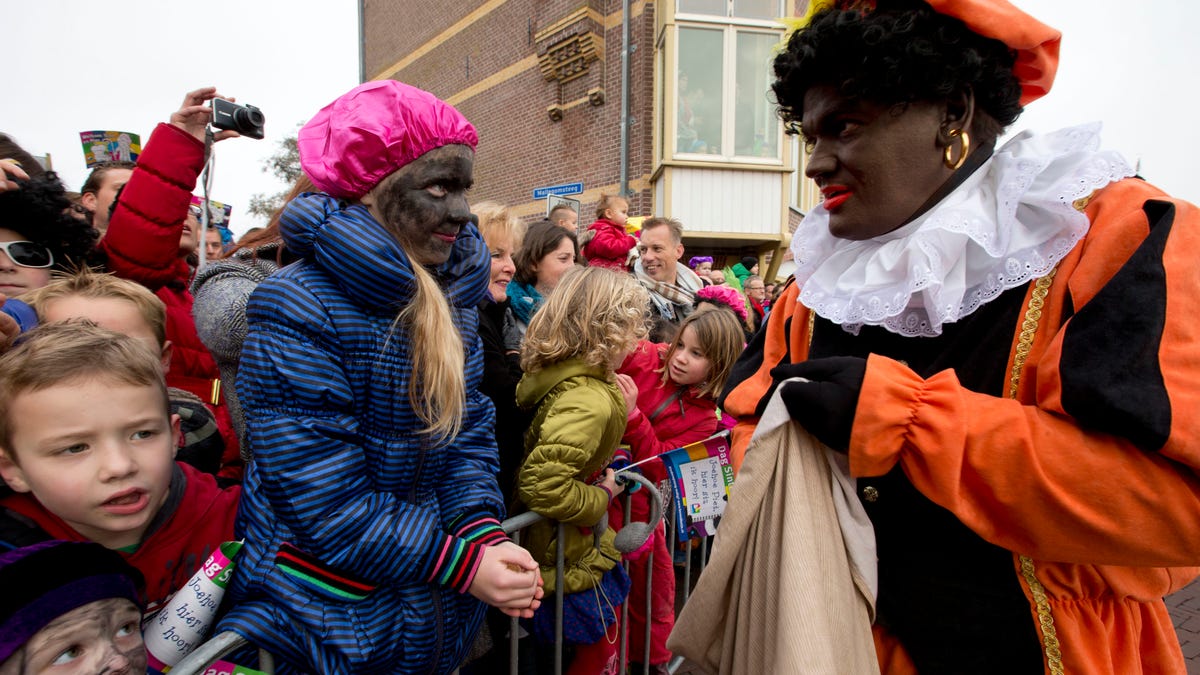
Nov. 16, 2013: Children, some with faces painted black, wait for "Zwarte Piet" or "Black Pete", right, to hand them candy after they arrived with Sinterklaas, or Saint Nicholas, in Hoorn, north-western Netherlands. (AP)
AMSTERDAM – The Dutch equivalent of Santa Claus arrived in the Netherlands on Saturday to the delight of thousands of children. But even as the Sinterklaas festival kicked off around the country a group gathered in downtown Amsterdam to protest one element of the party they see as unwelcome: his assistant in blackface makeup, Black Pete.
In the Dutch holiday tradition, St. Nicholas arrives by steamboat in mid-November and spends a month in the country with dozens of the Petes, who are clown-like figures that leave cookies, chocolate and other treats for children. The whole affair culminates in a night of gift giving on Dec. 5.
Protesters say the Petes -- who wear blackface makeup, red lipstick and frizzy "Afro" wigs -- are blatant racist caricatures and should be banned. But the large majority of Dutch people feel there is no racial insult intended by Black Pete. They say he's a positive figure of fun and that the dissent is a sign of political correctness gone overboard.
The debate over the figure has gone on for years, but it is now electrifying -- and polarizing -- the Netherlands as never before.
"The world is watching, and the Netherlands has been found wanting," anti-Pete protester Quinsy Gario told a group of about 300 supporters in Amsterdam.
Gario, an artist who has emerged as the public face of the anti-Pete movement, has been subjected to unprintable insults as well as death threats. But at Saturday's protest he had trouble speaking at times over supporters chanting his name.
He said the growing support underlines the change the national debate over Black Pete has recently undergone. Two years ago Gario was thrown face down on the concrete by police and dragged away for daring to merely wear a T-shirt with the text "Black Pete is Racism" near the place where Sinterklaas was due to arrive.
The debate exploded in the national media this year after it emerged that a panel of U.N. cultural experts was examining whether the tradition is racist. Some anti-Pete activists have suggested his blackface should be replaced with black smudges, since children are usually told his face has become black from going down chimneys.
A few weeks ago, more than 2 million people responded to remarks critical of the Dutch tradition by a U.N. expert by endorsing a Facebook petition to keep Zwarte Piet's image unchanged. That's nearly one-eighth of the entire Dutch population, indicating the depth of emotion over this issue in a country where religious or political debates often are met with a shrug.
On the outskirts of Saturday's demonstration in Amsterdam, two white Dutch women from Haarlem watched with bemusement.
"I'm for it, and my daughter is against," said Belinda Cortez. "But we can laugh about it."
"We laugh, but I really do get mad," said her daughter, Gina. "I think the tradition really needs an update."








































